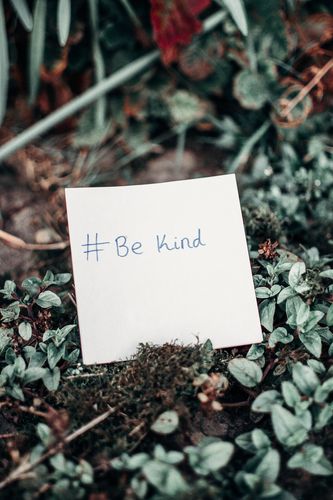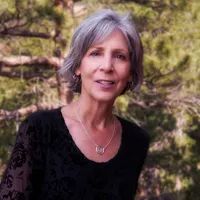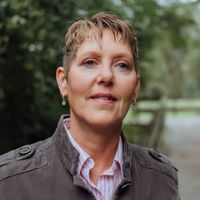Kindness
“We can do no great things; only small things with great love.” – Mother Theresa
Kindness is often a small thing. Yet, an act of kindness is always a great thing. Our world is broken, but not shattered. I steadfastly believe that we can put it back together, piece by piece, with mindful acts that embody kindness.
Have you ever been the recipient of a small act of random kindness that rocked your world? December 7, 2013, was the last day of my mom’s life. She had been on a fast track towards death since admitting herself to the hospital with chest and shoulder pain, a scant three months earlier. Her brief and unexpected journey on the planet was stressful, sad, and fraught with difficulty. As her primary caregiver, I had admitted Mom to a nursing home in Amesbury, MA under hospice care just 5 days previously. On that Saturday morning drive to the nursing home, I sadly reflected on the fact that this was likely her last day. I stopped at Starbucks to pick up a chai tea latte, always a soother. The barista at the drive-in window informed me that the driver in front of me had picked up the tab for my drink. I was floored by this random act of kindness. Had this woman somehow known? As I left the drive-in window, her car was stopped at a long red light, waiting to make a left turn out of the parking lot. Seeing an opportunity for gratitude, I jumped out of my car, ran to the driver’s window, and shared that I was on my way to a nursing home to sit with my dying mother. This kind stranger stepped out of the car and before you know it, we were both hugging and crying as if we were long-lost friends. One cup of chai tea. One simple act of kindness at a time when I needed it most. Her innocent gesture transformed my day by helping me see goodness despite the depth of my grief. My Mom died that day at 3:00 PM with my left hand on her shoulder and my right hand on her heart. That stranger’s gesture of kindness is with me still, embedded into my memories of my mother.
The following story from “How to Change the World by Making Someone’s Day" by David Wagner captures the essence of kindness. David is a world-renowned hairstylist, successful salon owner, artist, entrepreneur, and educator. He coined the term “daymaker”, defining it as “a person who performs deliberate acts of kindness with the intention of making the world a better place”. In one of his inspiring stories, David tells of a client who came in to have her hair done three weeks earlier than her usual appointment. He assumed that she had an important social engagement and asked about her evening plans. His client informed him that nothing special was happening. She simply wanted to look good that night. During a great scalp massage, shampoo, and hairstyle, they joked and laughed. At the conclusion of the appointment, the woman smiled radiantly, hugging David goodbye. A few days later David received a letter from this woman, admitting that she had planned to commit suicide the evening after her last appointment. She wanted her hair to look good for her funeral. The wonderful time she had with David had given her hope that things could get better. Instead of suicide, she made a life-affirming choice to check herself into the hospital and get professional help. His client thanked David for caring, even though he had not known what she was going through.
While we draw our conclusions, we often have no idea what is happening in another’s movie about their life. David had no understanding about the depth of his client’s suffering, yet his kindness emerged out of who he was. As the story illustrates, we also never know when our small actions of kindness will make a huge difference to another human. In a world that can appear harsh and unforgiving, I encourage you to look deeper to see the impact that is possible when we offer kindness to ourselves and others.
The word kindness comes from the old English word “kyndnes”, meaning noble deed or courtesy towards another. The concept of kindness often evokes the qualities of sweetness, caring, and gentleness. Yet, that is not the whole story. While kindness is all those things, it can also be fierce. My friend Maree McRae is the epitome of a fiercely kind woman. A talented singer/ songwriter, Maree is the founder of Heart–Mind–Connect, an organization dedicated to helping those suffering from mental health issues. Despite considerable obstacles, she has recently purchased and opened her first transitional housing property in the Denver area. Throughout her life, Maree has dedicated her talent, time, and energy to helping others, taking on seemingly impossible projects with an open and tender heart. Despite personal challenges with health and family, Maree is unstoppable in her quest to create a kind world, no matter who chooses to put up roadblocks. Her rationale is evidenced in this compelling quote from Maree, “After the suffering I’ve seen I certainly cannot sit back and be silent. It is my hope that this home can help comfort and change some lives. I know it will take time to get it going, and it’s going to be a real learning experience throughout, but I am excited to get it open”. Above all things, Maree is fiercely kind. She channels her outrage at life’s unfairness into actions that make the world a better place.
Here’s the deal. We are happier humans when we act kindly in service to others. The scientific community also validates the power of kindness as evidenced by the following three examples:
1. Harvard-trained happiness researcher Shawn Achor is the author of best-selling books on the happiness advantage. My husband and I attended one of Shawn’s talks in Boston years ago. His kind demeanor was genuine and his enthusiasm infectious. Shawn has identified five research validated practices to create lasting positive change in our lives:
1) Gratitude for at least three things per day
2) Journaling
3) Exercise
4) Meditation
5) Performing random acts of kindness
2. In a 2018 seven-day experiment by Lee Rowland and Oliver Scott Curry, happiness levels were measured in a group consciously performing acts of kindness to friends, family and strangers as compared to a control group who did not perform kind acts. The results indicated that performing acts of kindness strongly boosted happiness and well-being. Greater numbers of kind acts resulted in higher levels of happiness.
3. Jamil Zaki, a professor of psychology and the director of the Social Neuroscience Lab at Stanford University tells us that kindness is contagious. His findings show that those who are exposed to considerate acts adopt the underlying spirit of kindness and are motivated to imitate them. As a result, a single act of kindness benefits at least three individuals.
1. The person doing the act
2. The recipient of the act
3. Anyone who witnesses the act.
Jamil asserts that a single act of kindness can spread faster than a virus (take that COVID). Kindness certainly seems worth catching.
What can we DO to make kindness an intentional, conscious practice? The first piece is to be willing to lean into kindness towards ourselves. What could that look like? For starters, it would be to cease and desist self-flagellation about anything. Yup, anything. No more berating yourself for mistakes, failures, losing your keys or cell phone 20 times a day, none of it. No more blaming anyone else either.
Fortunately, the Buddhist-inspired practice of mindfulness offers us highly effective maps for how to do this. One of those maps is the Four Divine Abodes. These are the practices of:
1) Loving-Kindness
2) Compassion
3) Sympathetic Joy
4) Equanimity
Let’s focus on loving-kindness as a place to start. This powerful meditative practice is also known by the Pali word Mettā. As we sit, walk, or stand in meditation, we sequentially send loving kindness to our self, to someone we love, to someone who is a “neutral” acquaintance, to someone we dislike and finally, to all beings. The easiest way to start is to choose three or four simple phrases to repeat in your meditation such as:
- May I be safe and well
- May I be peaceful
- May I be held in loving kindness
- May I be happy
Bathe yourself in loving kindness, then send it to the others as described above, envisioning those beings in your mind’s eye.
- May you be safe and well
- May you be peaceful
- May you be held in loving kindness
- May you be happy
Finally, expand your wishes of well-being to the world.
- May all beings be safe and well
- May all beings be peaceful
- May all beings be held in loving kindness
- May all beings be happy
Once you conclude, take a few minutes simply to sit, breathe and notice the state of your heart. Simple? Sure. Easy? No. Worthwhile? Absolutely.
Why is it so hard? For me, when I am stuck in my sense of self-righteousness, I am often hanging on for dear life to my point of view. In those moments, my husband, Craig, likes to ask me,” Cynde, would you rather be right, or would you rather be happy?” If I am truly honest, there are many moments that my unenlightened self would rather be right! Yet, the satisfaction I get from that righteous mindset is always short-lived and not worth the carnage it creates.
Why is it worthwhile? Let me speak for myself. If I am going to be true to myself, my actions must be consistent with my belief in humanity. Otherwise, it’s just a lot of hot air. When I act with kindness, I step out of my small, stuck self into a bigger field of loving awareness that sees the beauty around me.
This is especially true when I offer kindness and understanding to a human who I dislike. By the way, in case you haven’t figured it out, this is hard! Yet, done with a genuine positive intention, my heart shifts to a softer, more open place that is peaceful and sees a bigger picture. Lest you think I am talking about forgiving cruelty or condoning horrific acts, nothing is further from the truth. Fierce kindness is not about being a pushover. It is about approaching the pain of the world with a compassionate and kind heart as opposed to a state of contraction and hatred.
A final question to consider. How could our world shift if we each acted with even a smidgeon more kindness, even when it feels hard. I invite you to partner with me and others on an experiment. What if we committed to 14 days of daily acts of random or not so random kindness? Let’s make it a habit. Are you in?













